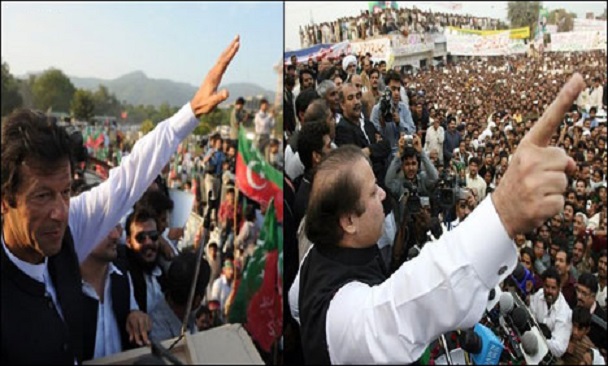One recalls the Pakistan National Alliance movement of 1977 that demanded resignation of Zulfikar Ali Bhutto and holding of fresh general elections. When the PNA movement got momentum, a stage came when the Pakistan People’s Party, which was in power, decided to demonstrate its popular support. Perhaps that was the point when the army concluded that it needed to intervene. Once the “Operation Fair-play” was planned, the army had no option left other than to go ahead, although the PNA had suspended its movement and the negotiations between the PNA and the PPP might have proved fruitful. Presently, the Pakistan Tehreek-i-Insaf has made a major concession by agreeing to resignation of Prime Minister Mian Nawaz Sharif for just thirty days during which the fairness or otherwise of the general elections of 2013 might be judged. The Pakistan Awami Tehreek also seems likely to arrive at some understanding if Punjab Chief Minister Shabaz Sharif agrees to step down.

But the Pakistan Muslim League (Nawaz) government is not ready to meet the demands half way. Instead, the PML (N) and its ally Jamiat-i-Ulema-i-Islam (Fazlul Rehman) have started holding rallies and public meetings to demonstrate their street power. Either the PML (N) leadership is over-confident that in weeks, if not days, the Azadi and Inqilab Marches will run out of steam whereas in the meantime the show of popular strength by the PML (N) will deter the army to take-over or it has anticipated that the army is likely to strike come what may and, therefore, it wants to go down as martyr of democracy. In any case, the present impasse cannot continue for an indefinite period. Now that the negotiations seemed to have reached a blind alley, the chances are that the army would have to intervene to resolve the crisis. This intervention can be in the form of ‘mediation’ and ‘persuasion’ that may lead to mid-term general election without constitutional deviation or out-right seizure of power for an indefinite period.
Constitutionally, the position is much like the one which the country faced in 1977. The general election of 2013 has lost credibility in the eyes of a very large segment of population. The moral authority of the Prime Minister has got seriously eroded. The negotiations have failed to resolve the political crisis. The Constitution does not provide any self-operating mechanism. The President is constitutionally helpless. The show of strength by the ruling party is likely to lead to bloodshed and spread of further chaos. The situation is quite identical to one that prevailed before the army take-over of 5 July 1977 and which offered the Supreme Court justification to validate the martial law on the ground of state-necessity in the Nusrat Bhutto Case. Let us a feeble hope that instead of repeating history the politicians would show maturity and some miracle would happen to rescue the situation. But the signs are very ominous.